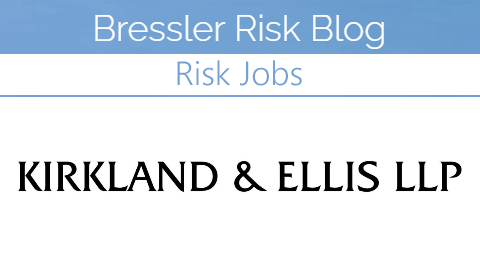I was pleased to receive a note from Ann Ostrander, Senior Director, Risk Management at Kirkland & Ellis, expressing enthusiastic interest in a sponsored post promoting several new risk opportunities at that firm.
“Director of Business Intake & Conflicts” —
- The Director–Business Intake Operations (“Director”) oversees the daily operations of the Firm’s Business Intake Conflicts Department (“BIC”).
- This includes ensuring that the activities of BIC support the Firm’s values and goals, and help Firm lawyers comply with their duties of professional responsibility and other ethics or regulatory requirements.
- The Director helps to develop both strategic and tactical plans for BIC and ensures the prompt, effective and efficient delivery of services to Firm lawyers and legal support staff.
- The Director interfaces with partner-led new business committees, individual partners and with the Office of General Counsel as needed.
- LOCATION: All US Offices
“Director of Risk Management (Planning & Special Projects)” —
- The Director of Risk Management–Planning and Special Projects (“Director”) provides support to leaders within the business units of the Firm’s Risk Management Department.
- This support consists of guidance regarding both strategic and tactical planning, direct project management, and assisting individual leaders with their professional and skills development.
- The Director is an internal consultant within the Risk Management Department, and uses developed consulting skills to help Risk Management leaders to become effective planners, implementers, and strategic/tactical thinkers.
- LOCATION: All US Offices
“Conflicts Manager” —
- The Conflicts Manager is responsible for the day-to-day operations of the Firm’s Conflicts Department, and oversees processes related to the conflicts search and analysis of potential new clients and new matters, the conflicts evaluation of lateral attorneys and other new hires, and potential conflicts in restructuring/debtor representations.
- This role is also responsible for determining staffing levels and global service coverage as well as workflow coordination to ensure all requests are being handled as expeditiously and accurately as possible.
- The Conflicts Manager works with the Business Intake & Conflicts Staff Training & Development team to prepare new Conflicts personnel to work effectively, and to evaluate, enhance, and develop conflicts search and analysis processes that support compliance with the rules of professional conduct, regulatory requirements, and Firm policies.
- LOCATION: Chicago Office
About Kirkland & Ellis:
- “Kirkland & Ellis LLP is a preeminent, full-service law firm with offices around the world and a staff as diverse as the practice areas we support. Our clients range from Fortune 100 companies to medium and small corporations, financial institutions, and private equity firms. Known for our commitment to excellence, Kirkland strives to provide superior service to our clients as well as our fellow employees. From Information Technology to Human Resources, Paralegal Services to Business Development, Kirkland offers non-attorney professionals challenging careers in a variety of functional areas. Whether starting or growing your career, Kirkland can offer a performance-driven culture filled with bright and innovative teams of co-workers.”
Read more about these position and apply via individual entries linked above.
And if you’re interested in seeing your firm’s listings here, please feel free to reach out…










